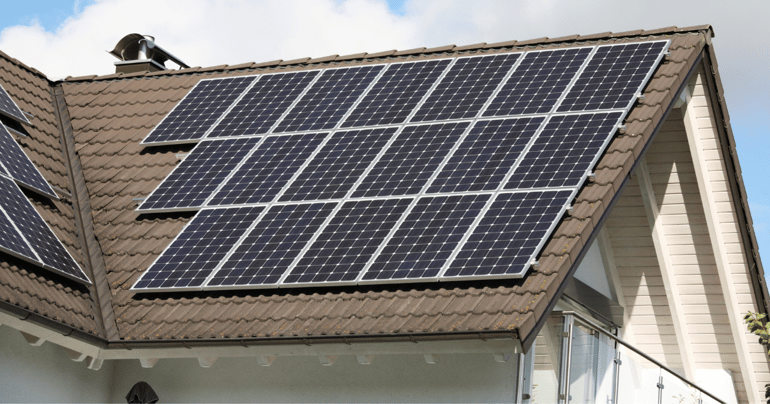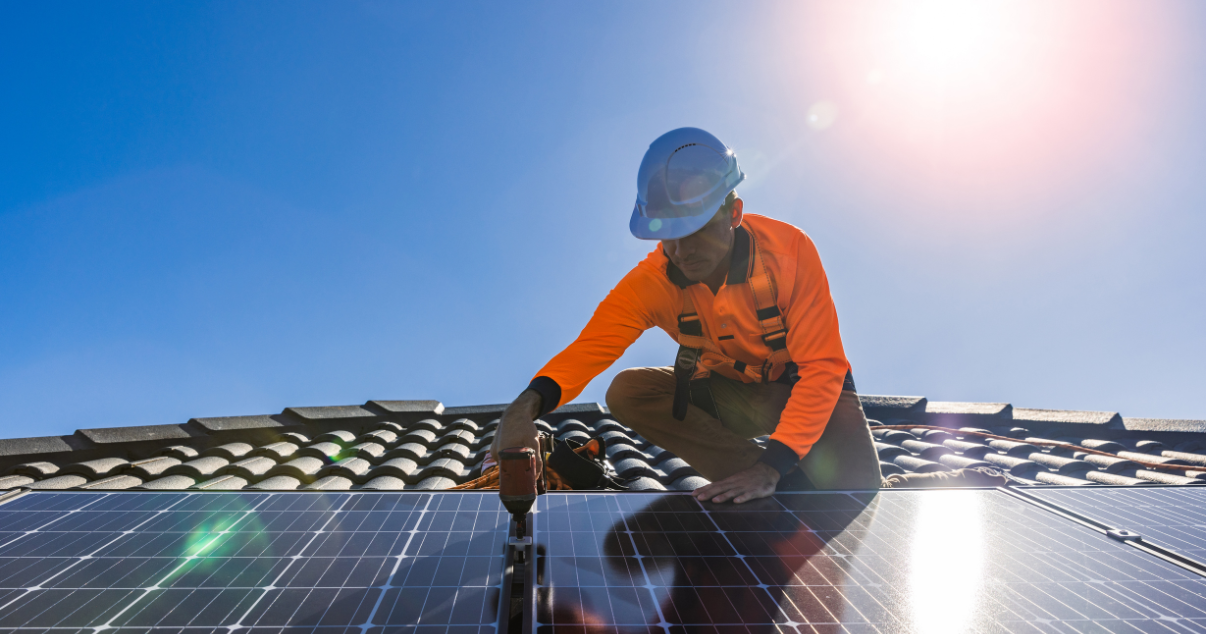If you’re considering installing solar panels to your home's roof, you might have thought about whether or not to include solar batteries as part of your installation.
It’s one of the most common questions we get asked when consulting with customers to design the perfect solar panel setup for their property and energy needs.
The honest truth is, there isn’t a clear ‘yes’ or ‘no’ answer to this question - it all depends on your individual requirements and your budget.
In this article, we’re going to recap what solar battery storage is quickly, the benefits it can deliver, and the considerations you’ll want to take into account when deciding if it’s the right choice for you.
What are solar batteries and how do they work?
Solar panels work by converting energy from the sun into usable electricity for your home.
Solar panel systems are only able to generate electricity during daylight hours when the sun is shining. The electricity that is generated during the day is used in a certain order - it powers your home first, with any energy left over being sent back to the power grid.
When you opt for solar battery storage, the process is slightly different.
Your solar panel installation still continues to power your home as the first priority. However, any excess electricity is used to charge a battery that is connected to your solar panel system.
The energy stored in your battery during the day can then be used to power your home in the evening when the sun has gone down. This reduces your need to purchase electricity from the national grid and can further reduce your energy bills.
What are the different types of solar battery?
Technically speaking, there are two main types of solar batteries that can be used for residential solar panel installations - lithium-ion and lead-acid.
In reality, the majority of modern solar panel systems use lithium-ion batteries due to their longer lifespan and lower maintenance requirements.
Both types of battery are effective for the regular charging/discharging cycle that’s needed for your solar installation, but there is a short-term vs long-term decision to be made.
Lead acid batteries typically have lower upfront costs but don’t have the longevity of lithium-ion batteries.
So, if you’re looking at a solar panel installation as a mid to long-term investment, lithium-ion is often the most sensible choice and the solution P4R recommends.
What about the choice of inverter? Is this impacted by solar battery storage?
This is a great question, as your choice of whether or not to opt for battery storage does have an impact on the most effective inverter for your solar panel installation.
To save any headaches and alterations to your system in the future, it’s important to work with your solar panel installer at the consultation stage to confirm if you want to include battery storage or not.
To help explain this, your solar panels generate electricity in direct current (DC), but your home is powered by alternating current (AC). To help make the electricity usable for your home, the direct current must be transformed into an alternating current via an inverter.
This is quite simple with a non-battery storage solar panel system, with either string inverters or micro-inverters being used to transform the current from DC to AC.
Where it becomes a little more confusing is when you consider that solar batteries require a direct current to charge. So, if you opt for solar battery storage, it’s better to install a hybrid inverter that’s capable of sending an alternating current to power your home and a direct current to charge your battery.
But what if you initially choose a system without battery storage and opt for a string inverter, but then want to add battery storage at a later date?
The good news is you achieve this relatively easily with some amendments to your solar panel system.
One option is to change your string inverter to a hybrid inverter.
A more common option is to use an “AC Coupled System,” which essentially acts as a second inverter and allows you to keep your existing string inverter in place.
The AC current from the string inverter can be converted back to DC by the AC-coupled inverter, which can then charge your battery.
It might sound a little complicated, and if you want to talk through it in more detail one of our friendly team will be more than happy to help.
The long and short of it is, if you know you want battery storage for a new solar panel installation - it’s better to install a hybrid inverter right from the start.
If you say ‘no’ to battery storage and change your mind further down the line, it’s going to be a bit of additional cost and work - but it’s relatively simple to retrofit.

Do solar panel installations with batteries require more maintenance?
The answer to this question is yes - but it’s unlikely to be a significant burden.
The more complex your solar panel installation is, and the more ‘parts’ it has, the more you’ll need to keep an eye on things in terms of monitoring and maintenance.
Any battery has a ‘lifespan’, and at some point, it will need replacing. The typical life of a solar battery is around 5-15 years, compared to the average lifespan of solar panels at 25-30 years. So you’re likely to need at least 2 batteries installed during the life of your solar panel installation.
The good news is that modern lithium-ion solar batteries are a low-maintenance technology that typically requires minimal attention over their lifespan.
Your battery management app will often alert you to any issues that might need addressing, so you’ll only need to schedule occasional maintenance inspections.
What about the upfront cost?
The benefits of battery storage come with a higher upfront cost compared to a traditional solar panel installation.
Solar battery prices vary depending on capacity and specification but generally range between £2000 and £6000.
Adding a battery to your solar panel system also adds a little more complexity to the setup of your installation, so it may also add to your labour costs.
However, although the initial investment is higher, solar batteries allow you to store excess solar energy for later use, lowering your reliance on the grid and reducing electricity bills in the long term.
Solar batteries: yes or no? P4R's expert recommendation
At Projects4Roofing, we tailor all of our proposals and recommendations based on the needs and requirements of individual customers.
So it’s really not viable or in line with our ethos to give a blanket ‘yes’ or ‘no’ to solar batteries.
The decision will all depend on your unique circumstances and what you’d like to achieve from your solar panel installation.
Having said that, for the majority of customers we speak to, the addition of solar battery storage makes practical and commercial sense.
Solar batteries maximise your savings on energy bills by allowing you to store excess solar power for later use, instead of relying on the national grid. A regular solar panel system covers around 30% to 50% of household power. But with a solar battery, it can increase to between 80% and 100%.
Solar batteries also provide peace of mind with backup power during outages. They can work in a power cut – but only if your installer sets them up with that capability.
Most solar panel systems will automatically switch off when a power cut happens, but for an additional cost, your installer can fit the system with a relay that enables it to send energy from your solar battery to your home when the power’s out.
Without this extra feature, neither your solar panels nor your battery will supply your home with any electricity during a power cut.
You should also make sure your battery inverter has a large enough capacity to supply all the electricity you need at any one time, or it could break under the strain.
For instance, if your battery inverter is 2 kW and you try to use a 3 kW oven, it won’t work.
Have a look at your household appliances, consider which ones you’d need during a power cut, and base the size of your battery inverter on how much electricity you’d need to use at once.
Put simply, choosing to add battery storage ultimately boosts your energy independence and demonstrates your commitment to reducing your carbon footprint.
However, the addition of solar batteries can also add to the upfront costs of a solar panel installation - which we understand can be a major consideration for homeowners.
If you’d like to discuss whether solar battery storage is the right choice for you, get in touch with Projects4Roofing today!


